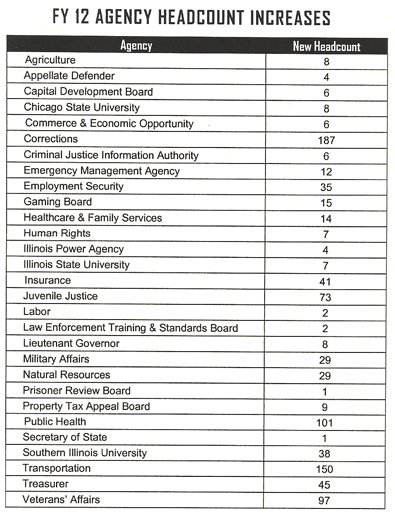|
Reader comments closed for the holiday weekend
Friday, Feb 18, 2011 - Posted by Rich Miller * Oy…
I saw the Tubes when I was 18. My friends and I were excited to see the show because we’d heard so many crazy stories about their tours, which got almost X-Rated. Unfortunately for us, the Tubes decided to change their image and aim for the Top 40 before that tour and the show we saw was as tame as tame could be. So, I’m not posting any of their videos. And I’ve never even wanted to go to an April Wine show. So, I ain’t posting any of theirs, either. * For the cheesehead refugees… You believe what you want to believe
|
|
Question of the day
Friday, Feb 18, 2011 - Posted by Rich Miller * The setup…
* The Question: Should state law be changed to give the Illinois attorney general’s office a set percentage of the settlements and lawsuits it wins for Illinois? Explain.
|
|
No knockout: Rahm’s still standing
Friday, Feb 18, 2011 - Posted by Rich Miller * Gery Chico’s campaign was saying privately earlier this week that there’d be a “knockout punch” attempt during last night’s debate. It didn’t happen, even though the headlines made it seem like there was more to it…
Meh. Chicagoist had the best headline: More of the Same at Last Night’s Debate. Lynn Sweet’s wasn’t bad, either: Debate bottom line: no winner, no losers * Emanuel’s opponents hit him with numerous issues, but he appeared to parry enough to get by. For instance, on the Rahm Tax..
On how he made so much money…
And immigration…
The SS Rahm sails on. * Watch the debate if you missed it…
* Roundup…
|
|
*** UPDATED x6 - Quinn comments - Could they be here for weeks? - One cheesehead sneaks home - Cullerton jabs Walker *** Escape from Wisconsin: Cheeseheads leave Rockford hotel, whereabouts unknown
Friday, Feb 18, 2011 - Posted by Rich Miller *** UPDATE 6 *** Full audio of Quinn comments… *** UPDATE 5 *** From WBBM Radio…
*** UPDATE 4 *** One of the cheesehead Senators says the Democrats could stay here for weeks, if necessary…
*** UPDATE 3 *** I’ve replaced the #Wisconsin hashtag with some major media Tweeters up there in Cheesehead Land. A bit easier on the senses, I think… *** UPDATE 2 *** Silly cheesehead…
*** UPDATE 1 *** Senate President Cullerton makes fun of the Cheesehead in Chief…
Cullerton’s office also says the Senate President has “contacted the office of the Democratic Senate Leader in Wisconsin to offer his support and assistance.” * The Rockford Register-Star caught up with some of those fleeing Wisconsin state Senators yesterday…
So, apparently, they split soon after their whereabouts were discovered. * More…
At least one of those Senators is now in Chicago. * RR-Star’s video… * A Rockford tea party member was also at the hotel and attempted to confront a Democratic Senator… * A couple of Quad Cities lawmakers weighed in…
* Sen. Dick Durbin also got into the act…
* Related…
|
|
*** UPDATED x1 *** Et tu, NYT?
Friday, Feb 18, 2011 - Posted by Rich Miller * Today’s New York Times lede is a blatant distortion of actual facts…
The “disastrous” bond sale the NYT refers to was Rod Blagojevich’s arbitrage gamble. The state sold bonds, then the pension funds invested the money and were supposed to make enough off of investment income to not only pay off the bonds but have some extra cash for the funds. That didn’t work as planned. Far from it. But this latest pension bond offering is just like last year’s bond sale. The state sells the bonds, deposits the money in the pension funds, then the state - not the pension funds - pays off the bonds. The proposed bond sale is a completely different animal from the Blagojevich scheme, which didn’t count on a massive international financial meltdown. Illinois isn’t “trying again.” It’s doing what it and other states have done in the recent past. Borrowing to make the pension payment isn’t a great option. It’s not smart at all. But there are few alternatives, other than finding $4 billion in cuts for the rest of this fiscal year. Unfortunately, the New York Times has hopped on the hyperbole bandwagon with the rest of the muni fearmongers. * The NYT also brings up what could be a real problem with the pension systems, but doesn’t elaborate…
It would be nice to know what that actuarial error was, but no explanation is offered. * Meanwhile, we briefly mentioned this yesterday, and the AP picks up on it today…
Here’s the headcount list from that House Democratic analysis… 
*** UPDATE *** The treasurer’s office says they never asked for a headcount increase. They asked for a level headcount. They say this is apparently a misprint. * Budget roundup…
|
| « NEWER POSTS | PREVIOUS POSTS » |

















